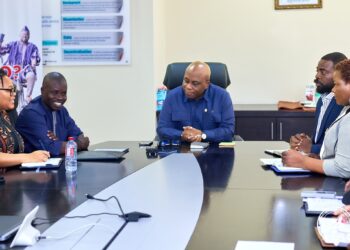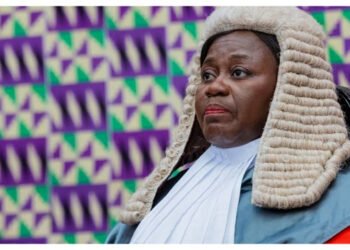During the Anti-Corruption Campaign Dialogue, Mrs. Mary Awelena Addah, Executive Director of the Ghana Integrity Initiative (GII), has discussed significant gaps in Ghana’s anti-corruption policies as presented by the various political parties in their manifestos.
Mary Addah’s comments were a call for enhanced policy development and enforcement, particularly in areas like corruption reporting, asset declaration, and public service transparency. The dialogue underscored the importance of engaging civil society in shaping practical, actionable anti-corruption measures within Ghana’s political landscape.
Initial Engagement and the Manifesto Gaps
She acknowledged some positive aspects in the manifestos but noted considerable unaddressed issues, despite civil society consultations intended to strengthen these policies.
“We see a lot of gaps in the manifestos that have been produced. Let’s say [if we’ve done some assessments] and we have looked at even the parties that have documented their policies statement, [that] we can refer to as proper manifestos, you realize that out of the total, many of them are good enough. However, we have a lot of issues that have not been attended to.”
Mrs. Mary Awelena Addah Executive Director of the Ghana Integrity Initiative (GII)
The engagement provided an opportunity for civil society to influence anti-corruption policy, but the resulting manifestos fell short of expectations, particularly in their practical application.
“The reflections of what came out [ we expected that they have would] be as robust and also as practical and proactive as we wished. Unfortunately, we didn’t see that happen.”
Mrs. Mary Awelena Addah Executive Director of the Ghana Integrity Initiative (GII)
Reverse Burden of Proof and Corruption Reporting
“The issue of the reverse burden of proof becomes very difficult. He who alleges must prove. And that is a difficulty for us because we are very much who mostly are unable to uncover the needed documentation to support whatever complains we are making. So it becomes difficult. We in the Ghana Integrity Initiative have a center that we use to facilitate corruption reports and also complaints that comes from whistleblowers.”
Mrs. Mary Awelena Addah Executive Director of the Ghana Integrity Initiative (GII)
Mary Addah highlighted the limitations posed by existing laws, which require citizens to present substantial evidence before corruption allegations are taken seriously.
she pointed out that the lack of a supportive legal framework restricts efforts to hold corrupt officials accountable.
“If I say, for instance, Beauty is corrupt…we should not wait for her to give us all the evidence to support,” Mary Addah added, advocating for more accessible and supportive measures.
The Issue of Asset Declaration and Enforcement
Mary Addah identified the failure to enforce asset declaration as a major gap across all political party manifestos.
She pointed out that the asset declaration process should be robust, including mechanisms for verification and public disclosure, ensuring transparency for public officials. This is especially important, as “a public officer must be transparent and accountable to the people who have put him there.”
Mary Addah also referenced Ghana’s Conduct of Public Officers Bill, initially introduced in 2013 and revisited in the Seventh Parliament, which aimed to support the fight against corruption by regulating asset declaration, conflict of interest, and gift policies.
However, the bill has faced repeated setbacks, and its failure to pass limits Ghana’s ability to monitor the wealth accumulation of public officials effectively.
Structural Challenges in Corruption Enforcement

Another major area of concern was the Criminal Offenses Act, sections 239 and 240, which define corruption primarily as bribery and facilitation.
Mary Addah highlighted the challenges of addressing unexplained wealth from Public servants under this framework.
“We see people who are cited, but then we are not able to investigate them because we do not have jurisdiction to do so under our current laws.’’
Mary Addah also emphasized that it’s not merely about having laws on the books, but rather about having “quality of the law and the law being able to bite.”
She mentioned that only four manifesto commitments referenced enforcement, revealing a lack of emphasis on ensuring accountability measures are practical and enforceable.
Public Service Delivery and Transparency
“We see a lot of gaps in how we deliver services…we need to be able to have protocols that ensure that services that are being delivered are publicly available.”
Transparency in service protocols would help the public understand processes such as land registration and hospital services, mitigating opportunities for “quick ways” and bribery.
“We say we are doing digitalization. Unfortunately, people do not understand this, and people who are thinking about bread and butter just want to go to the hospital or send their children to school.”
Urgent Need for Political Action
In closing, Mary Addah appealed to political parties to address these identified gaps in their manifestos.
She acknowledged the parties’ ongoing commitment to reform but stressed that more actionable steps are needed.
“The political parties still have an opportunity to pay attention to them,” she concluded, underscoring the urgency of these reforms to strengthen Ghana’s anti-corruption framework.
Mary Addah’s address at the Anti-Corruption Campaign Dialogue was a comprehensive critique of current political manifestos and Ghana’s anti-corruption policy framework.
She called for legal reforms, including robust asset declaration laws, measures for easier corruption reporting, and structural changes to support enforcement.
Mary Addah emphasized the need for clear, accessible public service protocols and transparency in digitalization efforts to close the existing gaps.
Her insights highlighted the critical role that civil society organizations like the GII can play in guiding effective anti-corruption reforms, encouraging political parties to make substantial commitments in their policies for a more transparent and accountable Ghana.
READ ALSO; Okyeame Kwame Idolises David Dontoh for His Influence





















